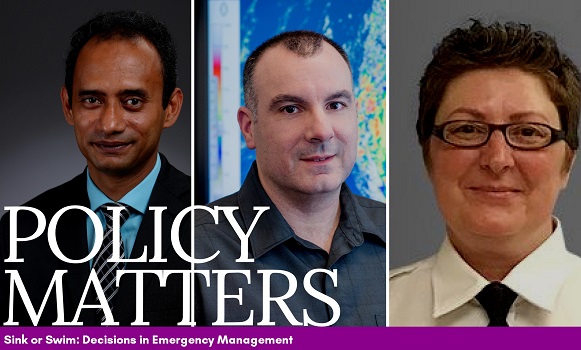Sink or Swim: Decisions in Emergency Management
 Tuesday, September 25, 2018
Tuesday, September 25, 2018
12:00 pm to 1:30 pm
Room 1011, Kenneth C. Rowe Management Building
±«Óătv University, 6100 University Avenue, Halifax, NS
Ěý´Ą
Last year, hurricanes Harvey, Irma, Jose and Maria resulted in considerable damage to the countries in the Caribbean, and the south eastern United States. Hurricane Harvey caused considerable damage in the state of Texas and particularly the city of Houston.  The total cost of damage from Hurricane Harvey was approximately $125 billion. Less than a month later, Hurricane Maria landed on the coast of Puerto Rico and recent reports have put the death toll at close to 3,000.Â
After a devastating hurricane season in 2017 and on the 15th anniversary of Hurricane Juan, the MacEachen Institute will bring together experts in emergency management, flood modelling and prediction, and evacuation traffic modelling, to discuss emergency preparedness for future coastal risks and evacuation scenarios.Â
The panel will address the steps needed to plan for these disasters, from determining which areas will be hit the hardest, to the logistics of evacuating the city.Â
Hosted in partnership withÂ

±«Óătv the speakers
±«Óătv the series
Policy Matters is a weekly panel discussion on major policy issues presented by the MacEachen Institute for Public Policy and Governance. Each discussion features thought leaders from civil society and focuses on one of the Institute's four research themes – Civic Engagement, Atlantic Canada and the World, Health Systems and Governance and Smart Infrastructure. Held each Tuesday from September 11 to November 6, the discussions take place in room 1011 of the Kenneth C. Rowe Management Building at ±«Óătv, from 12:00 pm – 1:30 pm. The events are designed to encourage public engagement with local, national and international policy issues and are open to the public.
Join the discussion on Twitter
#PolicyMatters2018




